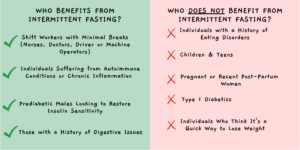New fat loss trends pop up daily, but second to Keto, Intermittent Fasting (IF) is one of the hottest trends to pop up in the last 10-15 years.
Nearly every week a client, prospect or friend asks for my thoughts on IF…
I have a lot of them – both good and bad.
But first…
What Is Intermittent Fasting?
According to the Mayo Clinic, intermittent fasting (IF) is the restriction of food for a period of time each day or week.
They also note 3 popular types of IF:
- Daily Time-Restricted Feeding – Eat normally, but within a “feed” window. A common example is only eating between 12:00 and 8:00 PM.
- Day Alternating Fasting – Follow a normal diet one day followed by a day of either complete fasting or a single small meal.
- 5:2 or Long Fasts – Follow a normal diet five days per week and fast 2 days per week.
While this list is not all-inclusive, it does highlight the cases we see on a weekly basis.
Intermittent Fasting IS a good strategy, but its popularity has led to the development of a number of misconceptions.
IF is NOT a Diet – Okay, well it is in the literal meaning (diet = the way or style a person typically eats), but NOT in the popularized term (“diet” = a way of eating to lose weight). Personally, I view IF as a STYLE of eating because it is entirely possible (and common) to gain weight through intermittent fasting.
It Leads to Weight Loss – IF speaks to the TIME you eat, not the AMOUNT. If you’re not eating in a calorie deficit during your feeding window, you won’t see any results on the scale!
It’s Suitable for Anyone – Many who start think it’s the answer to their snacking and binge eating, but in reality, this might be one of the WORST populations to implement IF. There are a few populations where it is suitable that we’ll discuss below.
It Means You Can Eat Whatever You Want – Low quality, highly processed food doesn’t magically become healthy when you eat it during your feeding window… Calories are still calories, and a calorie deficit is necessary for fat loss.
It Means You Have to Skip Breakfast – Everyone thinks IF means you skip the FIRST meal of the day… In reality, you could skip the last meal. You could also eat the first meal, fast, then eat the last meal. Breakfast typically gets chopped to allow for more flexibility and socialization later in the day.
Let’s not forget the endless debates over what does and does not break a fast…
Despite its misconceptions, IF has been shown to improve health on a number of levels within the body.
Reduce in Inflammation – Research shows it may be more beneficial than even some anti-inflammatory diets for improving conditions such as Arthritis, asthma, multiple sclerosis and stroke.
Improve Insulin Sensitivity – Fasting helps to lower blood sugar levels (some studies show a drop of 3-6% over 8-12 weeks!); however, there is research to suggest fasting might have the OPPOSITE effect on females.
A Reduced Risk of Cancer – While additional research is necessary, evidence shows intermittent fasting may help in cancer prevention and management of side effects from chemotherapy.
Intermittent Fasting & Fat Loss
Let’s talk about the REAL reason you want to try intermittent fasting…
FAT LOSS!
Look, I’d love to tell you that eating and fasting for set hours drops all the extra pounds, but that’s just not the case…
Like I said before, Intermittent Fasting only speaks to the TIMING of your eating…
Not the WHAT or HOW MUCH.
That means you can CRUSH your fast-feed windows but still eat hundreds of calories from junk food – THAT will DEFINITELY make you gain weight…
If intermittent fasting IS right for you, then you still have to adhere to a caloric deficit in order to lose body fat.
Want to know if you’re in a calorie deficit?
Check out the Calories 101 Guide to find out!
Who SHOULD Follow Intermittent Fasting?
Intermittent fasting has its perks…
It also has its pits…
That means its right for some populations, but not all.

It should be noted that individuals who practice intermittent fasting should be determined on an individual basis as health history, lifestyle and mental health do also factor into the decision.
Do you see what I see?
“Individuals seeking fat loss” isn’t on there.
Neither list.
Can intermittent fasting improve fat loss results?
Absolutely!
But too often individuals run to the hottest trend because it worked for a friend, coworker or social media influencer.
What those people neglected to tell you was that they also –
- Ate High Quality, Nutrient-Dense Foods
- Followed a Calorie Deficit
- Had a Lifestyle that Supported Intermittent Fasting
If you can restrict eating to specific windows in your day for the rest of your life (this is a lifestyle after all), then intermittent fasting might be a style of eating that suits you.
For the vast majority, quit skipping breakfast because you don’t have time and think it will save on calories…
Referenced:
Healthline:
https://www.healthline.com/nutrition/10-health-benefits-of-intermittent-fasting#TOC_TITLE_HDR_5
Forbes:
Mayo Clinic





